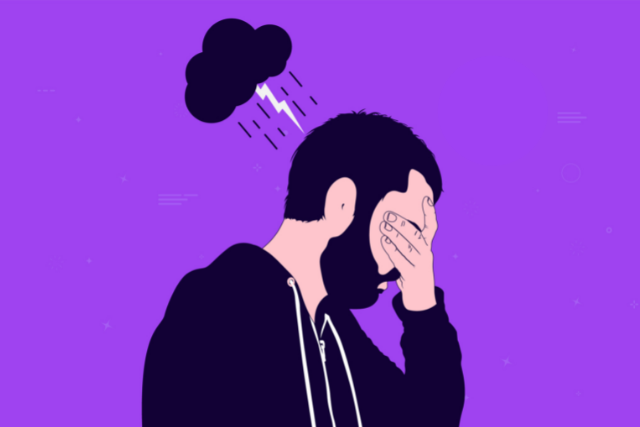
“No amount of guilt can change the past and no amount of worry can change the future.” ~Umar
Every emotion is felt by the body in a different way.
Pain can be sharp and biting, with a desire to lash out. Anxiety can also be sharp and biting, but with a desire to lash within. Sadness can feel like your body turning into stone, making every step seem impossible.
We all feel these emotions at times, but holding onto them is what causes damage. We must learn to shed them, as any “negative” emotion, if held on for too long, can release toxins that destroy our bodies over time.
Often, emotions like anger and anxiety and even sadness are symptoms of a more destructive emotion that destroys the human spirit. Robs us of our joy. And is unquestionably the heaviest of all emotional sensations we feel.
That emotion is guilt. An emotion I carried around for so many years that was the root cause of many other destructive emotions I felt.
Before I went on this journey within, I was always vacillating between feeling anger and anxiety. After I started clearing my mind, I spent several months letting go of both emotions, only to determine both were manifestations of the guilt I was carrying around inside.
Once I realized that, my focus changed to defeating guilt. My first step there: understanding what guilt is.
Sure, I knew what guilt felt like. After all, I had carried around different forms of guilt all of my life. But I didn’t really understand what guilt was.
So, I began to dig. I knew what caused guilt: doing something wrong. But why did doing something wrong make me feel guilty?
To figure that out, I started analyzing the feelings around the guilt, which is really a persistent feeling of “I should’ve …” or “I shouldn’t have…”
For example, I should’ve been nicer to the customer service rep. I shouldn’t have made fun of that person behind their back. I should’ve remembered that person’s birthday.
Additionally, I realized guilt stayed with me far longer than other emotions. Anger, for instance, came and went. But guilt persisted.
That’s when it clicked, and I understood what guilt really is: denial. Persistent denial. And that meant the antidote to guilt was obvious: acceptance.
I realized that to solve guilt, I had to accept what had happened. It’s that simple.
I’ll give an example to illustrate my point.
A couple of years ago, an older man I’m friends with got into a motorcycle accident and suffered a severe neck injury. After a week in the hospital and then several weeks recovering at home, he was able to walk again, and he had me and several other people over to his home for dinner to celebrate.
Our friend was wearing a neck brace and was taking painkillers, which made him a bit woozy. After dinner, we were sitting around his coffee table, and he stood up and walked over to get a bowl of chips. My feet were in his path, I was talking with someone else, and he tripped over them.
Thankfully, a person was alert and caught him before he fell. Otherwise, he would’ve seriously injured himself. Maybe even died.
Thank God he was okay. But I felt incredible guilt about tripping him, which I carried for several years. In my mind, all I wanted was to redo that moment and move my feet out of his path. I kept replaying in my head what I should’ve done.
To move past this, I had to accept what had happened, without self-judgment: I didn’t mean to hurt him. I just wasn’t paying attention. So I tripped him. And nearly killed him.
That’s what happened; nothing I can do about it.
It’s therapeutic, in this moment, to write that out. It’s full acceptance of what actually happened. And it also makes the lesson of the situation obvious—I need to be more aware of my surroundings.
Now, the truth is, I’ve done far worse things than accidentally trip a man. But still, the process is the same.
That’s one form of guilt, which is usually brought on by a horrible outcome. There’s also another form of guilt I needed to shed, which was far more common and persistent.
This guilt revolved around my relationships with other people.
What do I mean by this?
Here’s one example. Previously, when I hung out with people socially, I almost always had a headache afterward.
This headache, I later realized, was caused by guilt.
See, when I would hang out with people socially, I’d really want them to have a good time. I’d put pressure on myself to be “on” and to keep them entertained the whole night.
After the night would end, I’d beat myself up for all the perceived mistakes I made. Wish I would’ve said this or said that, done this or done that. I’d literally feel guilty about not being entertaining enough.
To remove this guilt, I needed to come clean with myself and accept the truth. Yes, I wasn’t entertaining every minute of the night. Maybe the people did have a bad time. So what?
Perhaps they’d never hang out with me again, sure. But, honestly, the bigger issue was why was I putting so much pressure on myself in the first place. I’m not responsible for them having a good time; I’m only responsible for myself having a good time. And this pressure was robbing me of that.
That realization helped me shed my guilt in social situations.
Beyond feelings of guilt from hanging out with people generally, there were specific people in my life I felt guilty around.
Often, I saw people I cared about who were struggling with some demon. Rather than accept them and the situation they were in, I was constantly wishing they would magically rid themselves of all impurities and never be sad again, and thought it was my job to help them with this.
This created guilt, because I wasn’t accepting who they actually were and the situation they were in. I was always wishing for it to change. This put them on the defensive and made it hard for me to help in a meaningful way.
The second thing I began to realize is, yes, they were struggling. But then again, wasn’t I struggling too?
It was ironic, really. Here I was, feeling guilty about other people’s struggles. And yet, I had my own struggles in front of me that I wasn’t addressing
It reminds me of these conversations I have with this couple I’m close with. I’ll talk to the husband one-on-one, and he’ll list the things he wishes his wife should work on, and how he feels bad for her. Then I’ll talk to the wife one-on-one, and she’ll list the things her husband should work on, and how she feels bad for him.
They both feel bad about something they have no control over while ignoring their own issues, which they have complete control over. I always laugh to myself when they start doing this.
And yet, I was doing the exact same thing.
The realization: I needed to stop trying to save other people because I can’t. They will do what they do, and all I can do is accept them for who they are.
Instead, I realized I needed to focus on what I actually have control over, which is “saving” myself.
As I continued on this journey, I began to see how much guilt I was carrying around in my mind. Which is to say, how much mind space I was dedicating to rethinking what I should’ve said or done in various situations from my past.
This, I’m now realizing, is complete madness. I cannot change the past. I must accept it.
I admit, accepting my full past can be painful at times. There are some dark things I’d rather not address. But it’s far better than wasting my life trying to redo something that already happened.
The good news? By accepting the difficult parts of my past, I’m able to quickly glean insights from those mistakes. And that’s further helped me remove attachments and clear my mind.
The point: Guilt is just denial. The reason it’s so heavy is because our denial prevents us from processing the reality of the situation in a meaningful way.
To process reality, we must first accept it, which sheds the guilt. And then, as we process what happened, we can learn from it and move forward.
About Paul Petrone
Paul Petrone grew up in the small town of Salem, Connecticut, moved to San Francisco in 2016, and now lives in New York City. Paul is passionate about writing and the spiritual journey and is grateful he got to put both together for his book, How I Found Peace: 14 Revelations That Cleared My Mind. Learn more about Paul on his website, paulpetroneauthor.com.













 Though I run this site, it is not mine. It's ours. It's not about me. It's about us. Your stories and your wisdom are just as meaningful as mine.
Though I run this site, it is not mine. It's ours. It's not about me. It's about us. Your stories and your wisdom are just as meaningful as mine.
Hi Paul, thank you for sharing your thoughts!
Such a thought provoking article.
Personally, I think that guilt is a healthy emotion. In an ideal situation it highlights when we have done something wrong. It holds the potential for us to change our behaviour should such a situation present itself again.
When guilt is dealt with in a healthy way, individuals learn from the situation, apologise for mistakes, commit to correcting behaviour, forgive themselves and move on.
In your situation, guilt was unhealthy because a) you held yourself personally responsible for everything. Which to me suggests a different emotion entirely, shame being the root of that.
And as you mentioned b) the element of denial / lack of acceptance prevented you from moving on.
I’m glad that you managed to address these issues, stopped blaming yourself / holding yourself responsible unnecessarily and learned to move on.
My thoughts totally resonate with this article. I was in a similar situation. I recently started she
shedding of my guilt with acceptance of myself. I have already started feeling lighter. 🙂